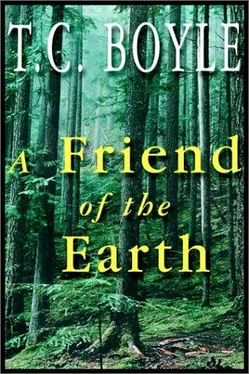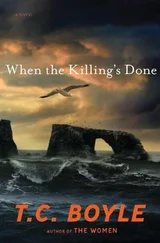It had to be one of the stranger transformations-from a penis sheath and limitless horizons to prison-issue cotton and a twelve-foot chain-link fence with concertina wire strung across the top. Tierwater let his legs dangle from the upper bunk in the room (not cell, room) he shared with Bill Driscoll, stock swindler, scam artist and interstate bilker of the elderly, and turned it over in his mind. Most offenders, white-collar or blue-, were either taken in the act or surprised in their own beds at 4:00 a. M., But how many went from a state of nature to civilization and incarceration in one fell swoop? Tierwater pictured some Wild West desperado hunkered over a jackrabbit stew one day and tossed into the Yuma Territorial Prison the next. Or the Bushmen themselves, run down on horseback and converted to slaves by their Boer masters. Or, even more poignantly, an animal captured in the wild, one of Uncle Sol's orangutans torn from the trees and fitfully gnashing at the alien mesh of the wire cage, the elephant trapped in the kraal and chained to a stake, the eagle with its wings clipped.
But if he felt like an animal, it wasn't a wild or even a feral one-no, he felt like a domesticated beast, a child's pony with its nose in the feedbag, the bloated dog curled up on a rug in front of the fireplace. For thirty days last year he'd subsisted on roots, insects and fish no longer than his index finger, and when they locked him up in here, he ate like three men, fried chicken and mashed potatoes, Boston cream pie, sloppy joes, pizza, spaghetti, french fries and onion rings, three scoops of ice cream with chocolate syrup and a can of root beer to wash it down. He was in possession of a belly for the first time in his life, and he'd even developed something resembling buttocks to fill out his prison-issue trousers. There was that, and the fact that this place-Club Fed, they called it-wasn't much more rigorous than Boy Scout camp. But Boy Scouts got to go home, and, however you sliced it, Tierwater was still in jail-locked up, incarcerated, separated from his wife and daughter and his checkbook and his cause — and he hadn't done a thing to deserve it.
They'd wanted to pin the fire on him — and the. Destruction of all that costly equipment belonging to Coast Lumber — but he got angry, got incensed, and denied everything with the self-righteous rage of the falsely accused, and, of course, they had no proof. Not a shred. Though they let Quinn in on the interrogation, and Quinn, rasping and nodding and scratching, was certain he was guilty, and did everything he could to prod the state and federal investigators into extending the list of charges. They didn't. Tierwater pled guilty to interstate flight and kidnapping, as per the plea bargain worked out by Fred and his team of wild-eyed, paper-shufflers, the other charges against him dropped in both federal and state courts. He was sentenced to three hundred and sixty days at the Federal Prison Camp in Lompoc, the state sentence to be served concurrently with the federal.
At first he'd been glad to come in out of the cold, happy just to find himself in a bed at night or following his nose to the dining hall three times a day. He was dead to everything else, as if he were recuperating from a serious illness. He didn't even see the other inmates, didn't see their shuffling feet or their faces frozen in fear, lust, rage and hate. All he saw was the plate, the food, the Twix bar and the Milky Way at the prison commissary. That didn't last long. Four or five days maybe. A week. Then he began to notice the guards as if they'd materialized out of a dream, he saw the fence, the barred windows, the sly and all-knowing faces ranged round him like masks on a wall. He was a criminal. He was in jail. And though the other inmates learned to stay out of his way, though there were classes to attend in everything from Zen to auto mechanics to poetry writing and there were three blacktop tennis courts and a workout room at his disposal, the fact of his incarceration began to gnaw at him till he could barely sleep at night. This was what the system had done to him. The machine. Progress.
Each day was eternal, but not in the way of those shimmering, unconscious days in the wilderness when all his senses were on fire and every least rustle of the leaves screamed food in his brain, but in the way of stupefaction, of boredom so black and viscous it was like sludge poured through a funnel into a very small container. He read, he slept, he watched TV with the other emasculated idiots. Out of desperation, and because Fred said it could reduce his sentence (it didn't), he took a class called "Salutary Self-Expression and the Paradox of the Me" from an embittered unpublished poet who taught part-time at the local community college and confessed that he was "attracted to the criminal mind." He worked in the prison printshop, turning out government forms. He played cards, checkers, chess, Parcheesi, chewed gum, put model airplanes together from kits Andrea brought him. Three times a week he played savage stinging sets of tennis with a young bankrobber by the name of Amaury Benitez, who'd been arrested on his doorstep twenty minutes after passing a note to the teller scrawled on the back of one of his own deposit slips. At night, when Bill Driscoll's breathing derailed itself and fell away into the twisting tunnels of deep sleep, he thought of Andrea, naked in the wild, and masturbated in a slow dream, making it last as long as he could.
Well, he was at the end of all that now, due for release in twenty-six days. Twenty-six days. And then he could go back to his normal life, meeting with his parole officer every Monday and slipping out in the wee hours to do his bit to bring the whole system crashing down, and don't think he hadn't had plenty of time to draw up an exhaustive list of key players — the very props and supports of the machine-with Sheriff Bob Hicks, Judge Duertner and Siskiyou Lumber right at the top. Ah, yes: freedom. And what was the day like out there beyond the barred windows and the chain-link fence? Sunny and cool, with an ocean breeze that smelled of sea wrack and clams-geoducks-dug wet from the sand and minced for chowder.
As Tierwater eased himself down from the bed so as not to wake Bill Driscoll, who seemed intent on sleeping out his sentence, he felt good, renewed, ready for anything. This was Saturday, visiting day, and he was expecting Andrea and Sierra in the early afternoon. He'd kiss his wife-once at the beginning of the visit, and once at the end, as sanctioned by the regulations — and he'd pat his daughter's hand and listen to her go on about school, boys and the mall and how she was so totally glad to be out of that hick town and the whole Sarah Dorkwater thing. He wanted to open up to her, to tell her how much he missed her and how he was going to make everything up to her as soon as he got out, but he couldn't; she always seemed so muted in the visitors' hall, intimidated by the place — and, he began to suspect, by her father too. He stared across the table at her, and didn't know what to say.
He saw her once a month, and each time she was a new person, nothing like the scrawny red-faced infant he'd thrown over his shoulder like a rug, or the little girl slashing away at the out-of-tune violin while the sun crashed through the trees, or even the loose-limbed teenager playing Monopoly on the steps of Ratchiss' cabin. She was growing up without him. She was fifteen now, nearly as tall as Andrea, and with the flowering figure of a woman, and he had so much to tell her. Or he thought he did. But when she was actually there, sitting across the table from him, and Bill Driscoll was complaining in a thunderous voice about the food to the bob-nosed little exercise freak who was his wife and Amaury Benitez's mother was sobbing into a handkerchief the size of a beach towel, he couldn't seem to summon any advice, fatherly or otherwise.
Читать дальше












